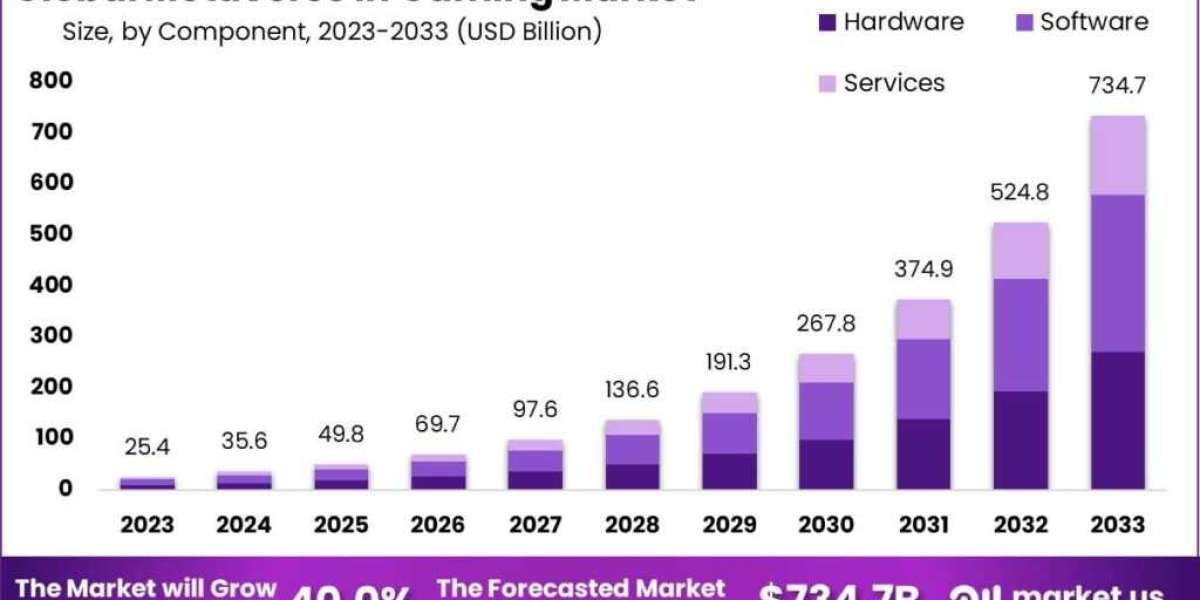The Global Metaverse in Gaming Market size is expected to be worth around USD 734.7 Billion by 2033, from USD 25.4 Billion in 2023, growing at a CAGR of 40% during the forecast period from 2024 to 2033.
Read More - https://market.us/report/metaverse-in-gaming-market/
The Metaverse in Gaming Market is rapidly transforming the gaming landscape by merging the virtual and physical worlds. This innovative blend allows players to interact in immersive, 3D environments where they can engage in gaming experiences that feel almost real. The growth of the Metaverse in Gaming is driven by advancements in technologies like virtual reality (VR), augmented reality (AR), blockchain, and artificial intelligence (AI). These technologies have made it possible to create lifelike avatars, realistic worlds, and seamless interactions, offering gamers unprecedented experiences.
As more people turn to gaming as a primary form of entertainment, the demand for metaverse gaming experiences continues to rise. The integration of social networking within gaming platforms is another key factor fueling this market's growth. Players are not just looking for games; they want social experiences where they can connect with friends, build communities, and even make a living by creating or selling virtual goods.
However, this exciting growth comes with challenges. The complexity of developing and maintaining such advanced platforms can be daunting. High costs associated with technology, infrastructure, and content creation can be barriers for smaller developers. There are also concerns about data privacy and security, as well as the potential for addiction and the impact on mental health.
Despite these challenges, the opportunities in the Metaverse in Gaming Market are immense. As the technology matures, new business models are emerging, including play-to-earn games and virtual real estate investments. Companies that can navigate these challenges and capitalize on the opportunities stand to benefit significantly from this booming market.
Emerging Trends
- Play-to-Earn Gaming: Players earn real-world rewards or cryptocurrency through their in-game activities, creating new economic opportunities within the metaverse.
- Cross-Platform Integration: Games are increasingly available across multiple platforms, allowing seamless transitions between devices and enhancing user experience.
- Social Gaming Experiences: The blending of social media and gaming platforms enables players to connect, share, and interact in more immersive ways.
- NFTs in Gaming: Non-Fungible Tokens (NFTs) are revolutionizing in-game asset ownership, allowing players to buy, sell, and trade unique digital items.
- AI-Driven Game Environments: Artificial intelligence is being used to create dynamic and responsive game worlds, where environments adapt to player actions in real-time.
Top Use Cases
- Virtual Reality Gaming: Fully immersive VR games where players can physically interact with the virtual world using motion controllers or VR headsets.
- Social Gaming Platforms: Games like Roblox and Fortnite, which offer social spaces where players can interact, build, and play together in a shared universe.
- Metaverse Marketplaces: Virtual markets where players can buy, sell, and trade in-game assets, often using cryptocurrency or real money.
- Esports in the Metaverse: Competitive gaming events hosted in the metaverse, where players and audiences can participate in virtual arenas.
- Educational Gaming: Games that offer learning experiences within the metaverse, blending entertainment with education, often through interactive simulations.
Major Challenges
- High Development Costs: Creating metaverse environments requires significant investment in technology, talent, and infrastructure, which can be prohibitive for smaller companies.
- Data Privacy and Security: The collection and storage of vast amounts of user data raise concerns about privacy breaches and data misuse.
- Content Moderation: Ensuring safe and positive interactions in the metaverse can be challenging, especially in user-generated content environments.
- Technical Complexity: Developing seamless, lag-free experiences across multiple platforms demands cutting-edge technology and can be difficult to achieve.
- Mental Health Concerns: The immersive nature of metaverse gaming can lead to addiction or other mental health issues, especially among younger players.
Market Opportunity
- Virtual Real Estate: The sale and development of virtual land within metaverse platforms are becoming lucrative opportunities, with users investing in spaces for gaming, socializing, and business.
- Advertising and Branding: Brands are increasingly exploring the metaverse as a new frontier for marketing, offering immersive ads and branded content within games.
- Content Creation: There is a growing demand for user-generated content, from game mods to custom avatars, providing opportunities for creators to monetize their skills.
- Blockchain Gaming: Integrating blockchain technology into games offers secure, transparent transactions, and has the potential to revolutionize in-game economies.
- Cloud Gaming: The rise of cloud gaming services allows users to stream games without high-end hardware, making metaverse experiences more accessible to a broader audience.
Conclusion
The Metaverse in Gaming Market is set to redefine the future of interactive entertainment. As technology advances, the lines between reality and the virtual world will continue to blur, creating new possibilities for players, developers, and businesses alike. The market's growth is fueled by a combination of cutting-edge technology, social connectivity, and innovative business models that cater to a new generation of gamers. While challenges such as high development costs, data privacy, and mental health concerns must be addressed, the opportunities are vast. From virtual real estate to blockchain gaming, the metaverse offers a wealth of possibilities for those ready to embrace this new digital frontier. As more players and brands enter the space, the Metaverse in Gaming Market will undoubtedly become a cornerstone of the global entertainment industry.



